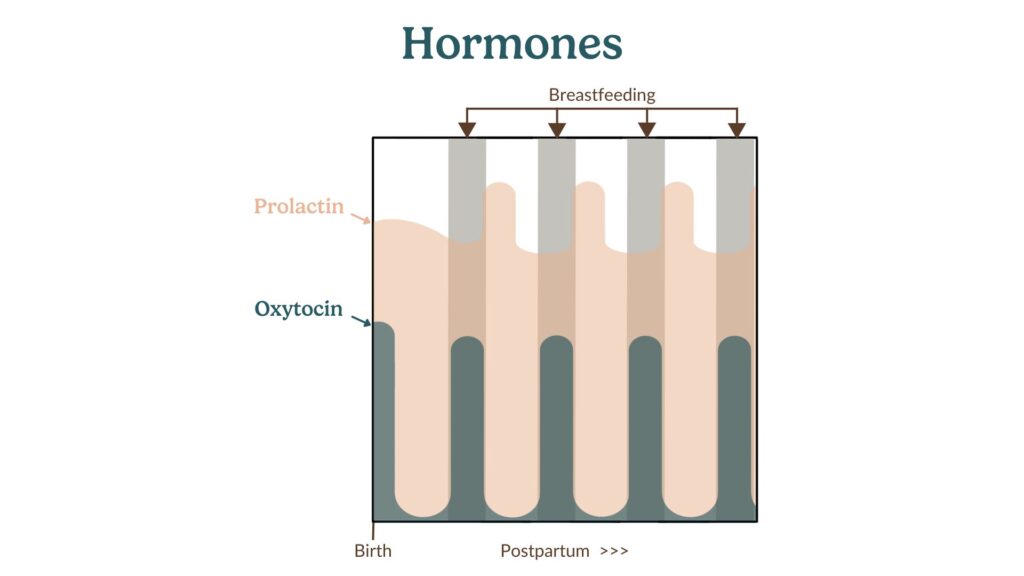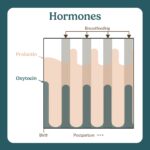hormones

Hormones
Hormones are chemical messengers in your body that regulate various physiological processes, including breastfeeding.
During breastfeeding, specific hormones play key roles in milk production and milk ejection. The primary hormones involved are prolactin and oxytocin. Prolactin stimulates the alveoli in your breasts to produce milk, while oxytocin causes the muscles around the alveoli to contract and release the milk through your nipples.
What to watch out for
Hormonal changes during breastfeeding are normal, but understanding them can help you manage potential issues:
- Low Milk Supply: If your body isn’t producing enough prolactin, you might experience low milk supply. Frequent breastfeeding can help stimulate prolactin production. If you’re still concerned after a week or two, you might want to see a lactation consultant.
- Let-down Reflex Issues: Stress and anxiety can interfere with the release of oxytocin, affecting the let-down reflex. Creating a calm and relaxing environment while breastfeeding can help. If you continue to have issues with let-down, seek advice from a lactation consultant. Learn more about let-down.
- Hormonal Imbalances: Conditions like polycystic ovary syndrome (PCOS) or thyroid disorders can affect your hormone levels and, consequently, your milk production.
If you encounter persistent problems with milk supply or let-down, it’s important to seek help from a healthcare professional or lactation consultant.
Physical limitations or health circumstances
Certain physical conditions or health circumstances can affect hormone levels and breastfeeding:
- Thyroid Disorders: Hypothyroidism or hyperthyroidism can affect milk production. Regular monitoring and management of thyroid levels are crucial for maintaining a healthy milk supply.
- PCOS: Women with PCOS may experience hormonal imbalances that can impact milk production. Working with a healthcare provider to manage PCOS symptoms can support breastfeeding.
- Postpartum Depression: Hormonal changes after childbirth can contribute to postpartum depression, which can affect breastfeeding. Seeking support and treatment for mental health is important for both you and your baby.
- Medications: Some medications can impact hormone levels and milk supply. Always discuss any medications with your healthcare provider to make sure they are safe for breastfeeding.
Other terms
Understanding other terms related to hormones and breastfeeding can provide a clearer picture of the process:
- Prolactin: This hormone is responsible for stimulating milk production. Levels increase during pregnancy and breastfeeding to make sure an adequate milk supply.
- Oxytocin: Known as the "love hormone," oxytocin causes the muscles around the alveoli to contract, facilitating milk ejection. It also promotes bonding between you and your baby. Learn more about oxytocin.
- Let-down reflex: The process by which oxytocin triggers the release of milk from the alveoli through the milk ducts to the nipple.
- Lactogenesis: The stages of milk production and secretion. Lactogenesis I occurs during pregnancy, lactogenesis II begins after birth, and lactogenesis III involves the maintenance of milk production.
- Colostrum: The first milk produced after birth, rich in nutrients and antibodies, providing essential immune support to the newborn.
- Engorgement: When breasts become overly full of milk, causing them to feel hard and painful. This is often due to hormonal regulation and can be relieved by frequent breastfeeding. Learn more about managing engorgement.


